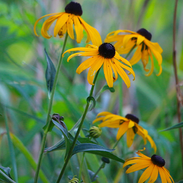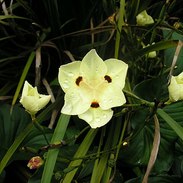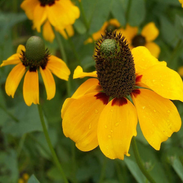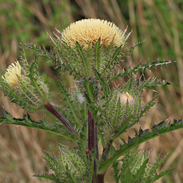The cheerful Black-eyed Susan (Rudbeckia hirta), with its vibrant golden petals and dark center, is a familiar sight in gardens and meadows. But this beloved wildflower is more than just a pretty face – it also boasts a rich history of medicinal use, particularly among Native American tribes. Let's explore the healing potential hidden within this sunny bloom.
Traditional Uses:
Immune System Booster: Black-eyed Susan has long been used to support the immune system and combat colds, flu, and infections. Some tribes considered it even more potent than Echinacea! This is likely due to its potential to stimulate the activity of white blood cells.
Wound Healer: The roots were traditionally used to create poultices and washes for treating wounds, sores, snakebites, and swelling. This suggests potential anti-inflammatory and antimicrobial properties.
Diuretic: Some tribes used Black-eyed Susan as a diuretic to increase urine production, potentially aiding in detoxification and addressing fluid retention.
Earaches: The liquid from the roots was used as ear drops to alleviate earaches, possibly due to its anti-inflammatory effects.
Worm Infections: Black-eyed Susan was used to treat worms in children, indicating potential anthelmintic (anti-parasitic) properties.
Potential Properties & Modern Research:
While scientific research on Black-eyed Susan is still emerging, some studies support its traditional uses:
Anti-inflammatory: Studies have identified compounds in Black-eyed Susan with anti-inflammatory activity, which may explain its use for wounds, swelling, and earaches.
Antioxidant: The plant contains antioxidants, which can help protect cells from damage caused by free radicals.
Immunomodulatory: Research suggests that Black-eyed Susan may enhance immune function by stimulating the activity of immune cells.
Cautions and Considerations:
Allergies: Black-eyed Susan belongs to the Asteraceae family, so individuals with allergies to ragweed, daisies, or chrysanthemums may experience allergic reactions.
Pregnancy and Breastfeeding: Pregnant and breastfeeding women should avoid using Black-eyed Susan due to a lack of safety data.
Drug Interactions: There is limited information on potential drug interactions, so consult with a healthcare professional if you are taking any medications.
Sustainable Harvesting: If you plan to wildcraft Black-eyed Susan, ensure you do so sustainably and with respect for the environment.
The Future of Black-Eyed Susan:
As interest in natural remedies grows, Black-eyed Susan holds promise for future research. Further scientific investigation is needed to fully understand its therapeutic potential and develop safe and effective applications.
Disclaimer: This blog post is for informational purposes only and should not be considered medical advice. Always consult with a qualified healthcare professional before using any herbal remedies.













